Nursing Assistant
Types of Degrees Nursing Assistant Majors Are Getting
The following table lists how many nursing assistant/aide and patient care assistant/aide graduations there were for each degree level during the last year for which data was available.
| Education Level | Number of Grads |
|---|---|
| Basic Certificate | 37,077 |
| Undergraduate Certificate | 921 |
| Associate Degree | 74 |
| Bachelor’s Degree | 25 |
What Nursing Assistant Majors Need to Know
O*NET surveyed people in occupations related to nursing assistant and asked them what knowledge areas, skills, and abilities were important for their jobs. The responses were rated on a scale of 1 to 5 with 5 being most important.
Knowledge Areas for Nursing Assistant Majors
According to O*NET survey takers, a major in nursing assistant should prepare you for careers in which you will need to be knowledgeable in the following areas:
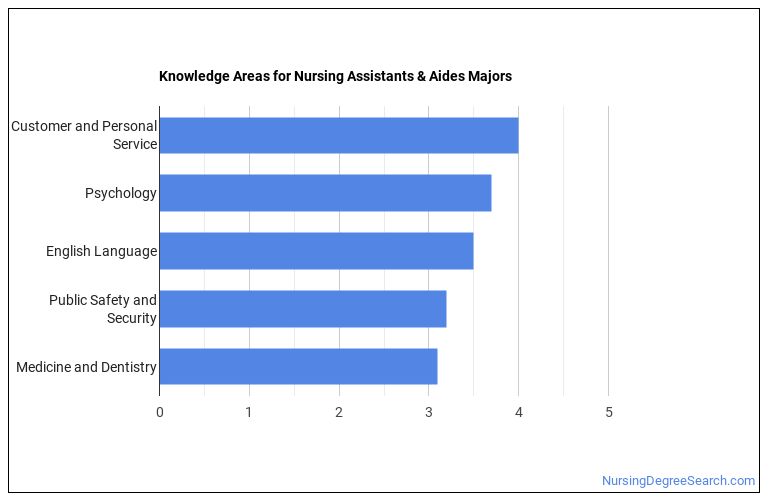
- Customer and Personal Service - Knowledge of principles and processes for providing customer and personal services. This includes customer needs assessment, meeting quality standards for services, and evaluation of customer satisfaction.
- Psychology - Knowledge of human behavior and performance; individual differences in ability, personality, and interests; learning and motivation; psychological research methods; and the assessment and treatment of behavioral and affective disorders.
- English Language - Knowledge of the structure and content of the English language including the meaning and spelling of words, rules of composition, and grammar.
- Public Safety and Security - Knowledge of relevant equipment, policies, procedures, and strategies to promote effective local, state, or national security operations for the protection of people, data, property, and institutions.
- Medicine and Dentistry - Knowledge of the information and techniques needed to diagnose and treat human injuries, diseases, and deformities. This includes symptoms, treatment alternatives, drug properties and interactions, and preventive health-care measures.
Skills for Nursing Assistant Majors
nursing assistant majors are found most commonly in careers in which the following skills are important:
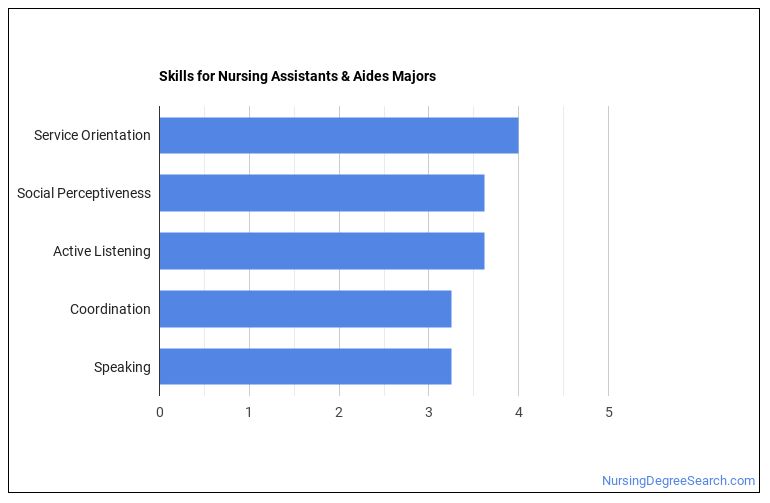
- Service Orientation - Actively looking for ways to help people.
- Active Listening - Giving full attention to what other people are saying, taking time to understand the points being made, asking questions as appropriate, and not interrupting at inappropriate times.
- Social Perceptiveness - Being aware of others’ reactions and understanding why they react as they do.
- Speaking - Talking to others to convey information effectively.
- Monitoring - Monitoring/Assessing performance of yourself, other individuals, or organizations to make improvements or take corrective action.
Abilities for Nursing Assistant Majors
Nursing Assistant majors often go into careers where the following abilities are vital:
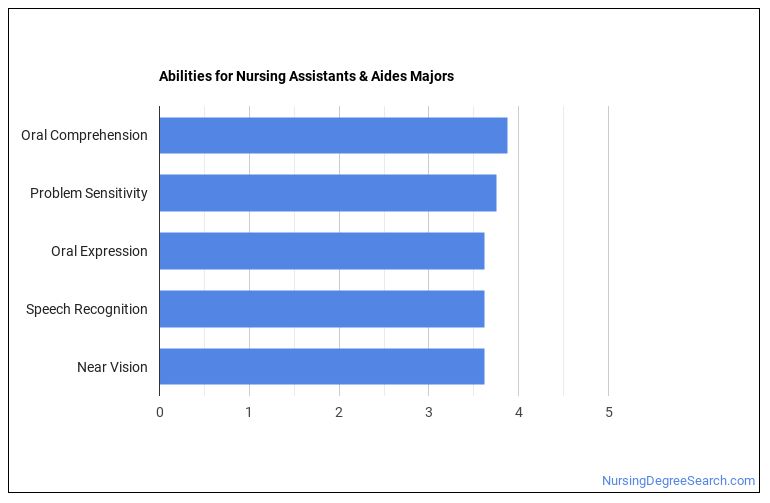
- Oral Comprehension - The ability to listen to and understand information and ideas presented through spoken words and sentences.
- Problem Sensitivity - The ability to tell when something is wrong or is likely to go wrong. It does not involve solving the problem, only recognizing there is a problem.
- Oral Expression - The ability to communicate information and ideas in speaking so others will understand.
- Near Vision - The ability to see details at close range (within a few feet of the observer).
- Speech Recognition - The ability to identify and understand the speech of another person.
What Can You Do With a Nursing Assistant Major?
People with a nursing assistant degree often go into the following careers:
| Job Title | Job Growth Rate | Median Salary |
|---|---|---|
| Nursing Assistants | 11.5% | $28,540 |
Who Is Getting a Bachelor’s Degree in Nursing Assistant?
Racial-Ethnic Diversity
At the countrywide level, the racial-ethnic distribution of nursing assistant majors is as follows:
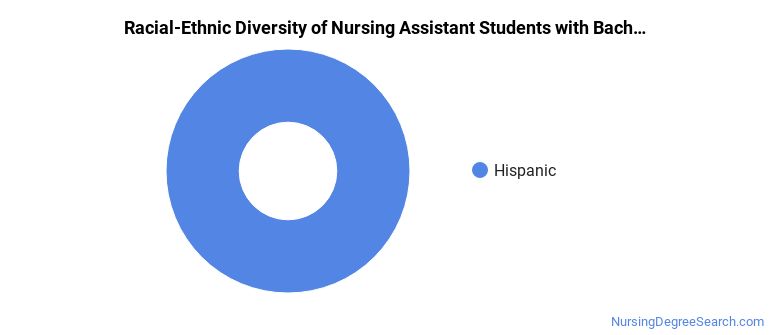
| Race/Ethnicity | Number of Grads |
|---|---|
| Asian | 0 |
| Black or African American | 0 |
| Hispanic or Latino | 25 |
| White | 0 |
| International Students | 0 |
| Other Races/Ethnicities | 0 |
Amount of Education Required for Careers Related to Nursing Assistant
Some careers associated with nursing assistant require an advanced degree while some may not even require a bachelor’s. Whatever the case may be, pursuing more education usually means that more career options will be available to you.
How much schooling do you really need to compete in today’s job market? People currently working in careers related to nursing assistant have obtained the following education levels.
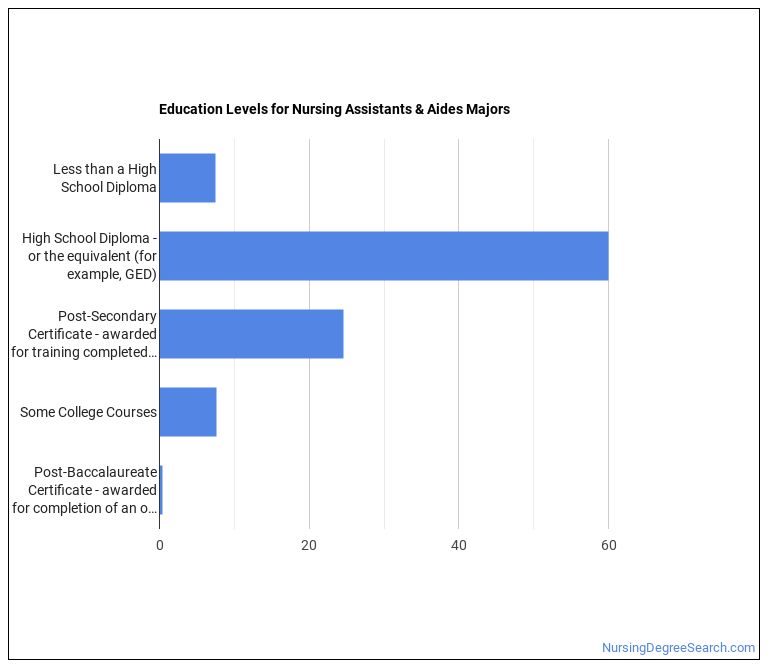
| Education Level | Percentage of Workers |
|---|---|
| Less than a High School Diploma | 7.4% |
| High School Diploma - or the equivalent (for example, GED) | 59.9% |
| Post-Secondary Certificate - awarded for training completed after high school (for example, in agriculture or natural resources, computer services, personal or culinary services, engineering technologies, healthcare, construction trades, mechanic and repair technologies, or precision production) | 24.5% |
| Some College Courses | 7.6% |
| Post-Baccalaureate Certificate - awarded for completion of an organized program of study; designed for people who have completed a Baccalaureate degree but do not meet the requirements of academic degrees carrying the title of Master. | 0.5% |
Online Nursing Assistant Programs
The following table lists the number of programs by degree level, along with how many schools offered online courses in the field.
| Degree Level | Colleges Offering Programs | Colleges Offering Online Classes |
|---|---|---|
| Certificate (Less Than 1 Year) | 0 | 0 |
| Certificate (1-2 years) | 86 | 2 |
| Certificate (2-4 Years) | 1 | 0 |
| Associate’s Degree | 10 | 0 |
| Bachelor’s Degree | 0 | 0 |
| Post-Baccalaureate | 0 | 0 |
| Master’s Degree | 0 | 0 |
| Post-Master’s | 0 | 0 |
| Doctor’s Degree (Research) | 0 | 0 |
| Doctor’s Degree (Professional Practice) | 0 | 0 |
| Doctor’s Degree (Other) | 0 | 0 |
Explore Major by State
Alabama
California
District of Columbia
Idaho
Kansas
Maryland
Mississippi
Nevada
New York
Oklahoma
South Carolina
Utah
West Virginia
Alaska
Colorado
Florida
Illinois
Kentucky
Massachusetts
Missouri
New Hampshire
North Carolina
Oregon
South Dakota
Vermont
Wisconsin
Majors Related to Nursing Assistant
You may also be interested in one of the following majors related to nursing assistant.
| Major | Number of Grads |
|---|---|
| Licensed Practical/Vocational Nurse Training | 45,886 |
| Other Practical Nursing, Vocational Nursing and Nursing Assistants | 4,826 |
References
*The racial-ethnic minorities count is calculated by taking the total number of students and subtracting white students, international students, and students whose race/ethnicity was unknown. This number is then divided by the total number of students at the school to obtain the racial-ethnic minorities percentage.
- College Factual
- College Scorecard
- National Center for Education Statistics
- O*NET Online
- U.S. Bureau of Labor Statistics
- Usual Weekly Earnings of Wage and Salary Workers First Quarter 2020
More about our data sources and methodologies.
